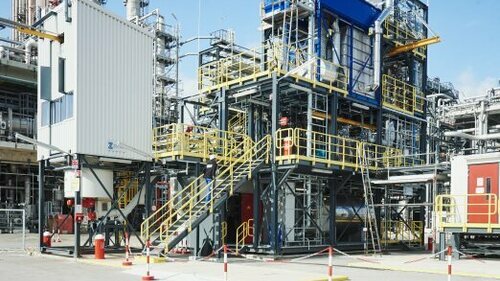OMV starts up co-processing plant at Schwechat refinery in Austria
OMV has started up its co-processing plant at the Schwechat refinery in Austria. Almost EUR 200 million have been invested to allow up to 160,000 metric tons of liquid biomass being converted into high-quality renewable hydrogenated vegetable oil components. These more sustainable blending components will be used also for formulation of OMV’s MaxxMotion Diesel. It will have a new unique CleanTech+ formula combining lower carbon footprint with superior performance. The new product will be available for consumers at approximately 550 OMV filling stations in Austria, the Czech Republic, and Hungary during the course of 2024.
The co-processing of hydrogenated vegetable oil will allow OMV to reduce its carbon footprint by up to 360,000 metric tons of fossil CO2 per year - the equivalent of 38,000 cars driving around the globe. The plant has considerable feedstock flexibility. Waste-based (e.g., used cooking oil) and advanced feedstocks (e.g., liquid from nut shells), which are not competing with food and feed production, can be used for co-processing. This production fully complies with the requirements for more sustainable production of fuel components in the EU and is certified in accordance with ISCC-EU (International Sustainability & Carbon Certification).
The newest generation of OMV MaxxMotion Diesel with a unique CleanTech+ formula features a premium bio component comprising 20 percent Hydrotreated Vegetable Oil (HVO) and an exclusive additive package. This integration of renewable components during the refining process, known as co-processing technology, differentiates OMV MaxxMotion Diesel as a more sustainable fuel of superior quality and performance. The fuel meets the highest quality standards and can be used in all vehicles as a drop-in solution to make mobility more sustainable.
“In line with our Strategy 2030, we are investing in transforming the OMV refinery in Schwechat. The new plant highlights OMV’s innovative capabilities as one of the first companies in Europe to deploy co-processing on an industrial scale. It also allows us to support the trend towards more sustainable mobility at high levels of quality and performance across our extensive filling station network,” said Martijn van Koten, OMV Executive Vice President Fuels & Feedstock.
Categories
Chemical substances
Countries
Latest news
BASF becomes first producer of renewable ammonia in Central Europe at Ludwigshafen, Germany
BASF SE, Ludwigshafen →Renewable energy-derived hydrogen replaces fossil hydrogen in production process. Expansion of ammonia value chain with further sustainable products.
MSSA doubles production capacity for sodium methylate in La Rochelle, France
The strategic investment will double MSSA's annual production capacity for sodium methylate from 20,000 tonnes to 40,000 tonnes, reinforcing the company's commitment to meeting the growing demand f...
Dreexo Energy to Launch Circular Economy Plant in Cádiz, Advancing Sustainable Industry in Andalucía
Construction of a new facility in the Cádiz Free Trade Zone. The project is expected to break ground in early 2026 and be operational by year’s end.
Vioneo appoints Wood to design world’s first industrial scale fossil-free plastics facility in Antwerp, Belgium
Port Of Antwerp →the renewably powered and energy efficient plant will be the first facility in the world capable of achieving the production of fossil-free plastics using green methanol at an industrial scale.
